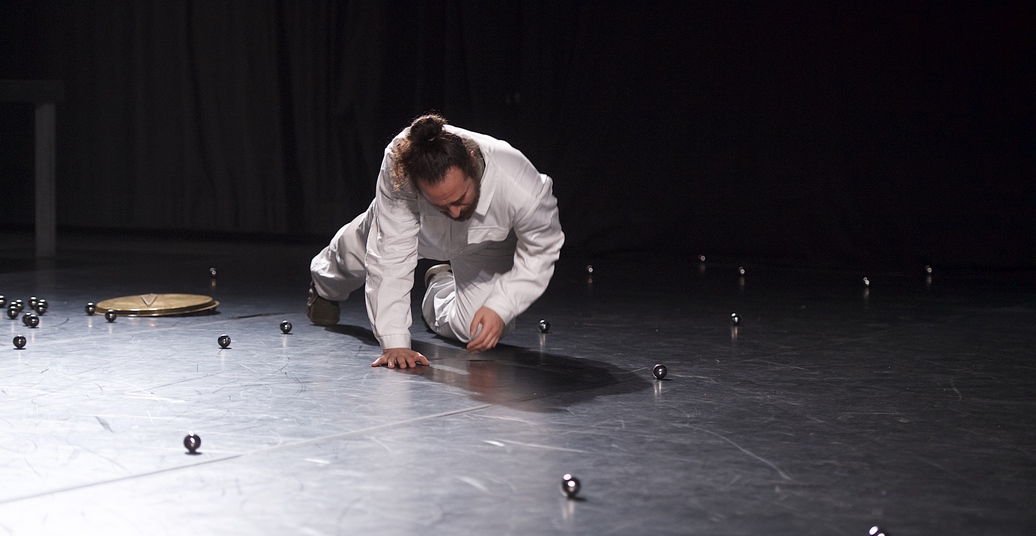What happens when a monk, a priest and a rabbi walk into a bar? Scratch that…you probably know that one already.
Okay, what happens when a Jewish performer walks up to their grandmother’s cupboard of antiques?
.
.
.
.
Where do you think this was going? Is there space for this joke in a dance review today? In Germany? And who can make such a joke?
There is, in fact, no joke to make. But I take this chance to tread the nuance that art allows to reclaim what may be said. Performer David Bloom does it too, with “nigunim”. Premiered on 23 March 2023 at Uferstudios, the solo was part of Tanzfabrik’s ‘Narratives and Transgressions’ curatorial fold.
Using Jewish songs of worship – called nigunim in Hebrew – choreographer David Bloom reclaims narratives within Judaism to reflect his personal and political relationship to the faith. Through song and speech, he brings forth the diverse positions that Jewish-identifying persons profess in their body.
Bloom walks onto the stage with casual cordiality, acknowledging and wishing some of the audience members. This cordiality flows straight into the story he begins to narrate. This story begins with Bloom’s great-great grandparents who left Belarus in 1894 to reach the US. With this relocation, they went from being identified as ‘Jews’, to being identified as ‘White’. Thereby Bloom directly places identity as a central theme of “nigunim”, with the approach that one can hold two different truths at the same time. He holds up a brass tray that has been passed on to him from his great-great grandparents handling it and their story with care. But —- baaaammmm! The tray topples to let a pile of silver balls fall, roll and scatter across the room! Not only two different truths, many truths, identities and positions lie scattered across the room. In the performance, we hear them as voice snippets that bring up statements about those who hold other identities along with their Jewish faith such as Black Jews in America, Jews who are against occupation and apartheid and Jews who identify as queer. Intersecting voices chase each another in pursuit of, as the programme note says, ‘a queer, inclusive, activist Judaism’. Carrying the spirit of debate and argumentation from the Judaic Talmud, they seem to wrestle and search. “What to do? What to do?” one voice asks in earnest.
Bloom too seems to be asking himself this question, then finding a foothold in song and movement. Rained upon by these voices and lying among the scattered silver balls, he lets out a low vibrating hum. The hum grows into a tune, gradually layered with stomps, claps, momentum and words. The words find song – one written by Bloom himself – claiming “We were all there at Sinai”. He delivers an imaginary list of those who hypothetically were at Mount Sinai, the principal site of divine revelation in Jewish theology. His list includes Marxists, Freudians, Buddhists, Jews, and all categories of everyone who disagree with each other.
During the post-show conversation, Bloom shares that his research process included interviewing Jewish identifying activists, bodywork practitioners and also his parents. In finding cross-sections with people who work between spirituality and activism or Judaism and the body, the artist’s work appears to be informed by the will to wrestle with seeming contradictions. So when we hear voices of a Rabbi who is a Body-Mind Centring® practitioner, or one who is a former drag queen, and a Jewish lawyer from the IfNotNow movement, it becomes clear. It becomes clear that for the choreographer, they too, were at Sinai.
One could wonder at the curatorial categorisation of this work as ‘transgression’. In a sense, when comparing with Berlin’s independent dance scene, a work engaging with faith and worship music is indeed transgressive. For me, Bloom’s use of nigunim or the shofar (a musical horn used for Jewish religious purposes) particularly makes for a transgressive choice. Across religions, cultural practices directly related to worship tend to remain the domain of the right-wing. By reclaiming the music for this performance, he usurps it back as nagan (weapon). Not asking If one may put these words in their mouth but rather how else these words could be held in the body, frees oneself and the nigun as well.
The performance “nigunim” thrives most when Bloom is not presenting but rather channelling into a personal space, humming to himself as he gathers the scattered balls. Gathering them from in between legs, underneath pillows, behind the stage curtain and sound monitors, he meets the audience but appears to also be staying with himself. Bloom sings a nigun (song) written and composed by Menachem Creditor, that appears to sooth him while also propelling him forward. “Olam Chesed Yibaneh. We will build this world with love.” Its repetition over a long duration also leaves space for doubts to emerge: Will we? An entire world? Is it still possible? Will we manage with love alone? But continued and repeated over a long duration, without trying to convince us, the nigun organically becomes an earworm, a lullaby, and a slogan. “Olam Chesed Yibaneh. We will build this world with love.”
The solo performance “nigunim” by David Bloom was presented from 23-25 March 2023 by Tanzfabrik Berlin at Uferstudios.




